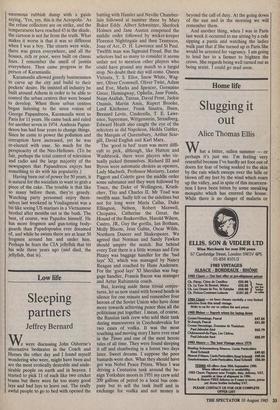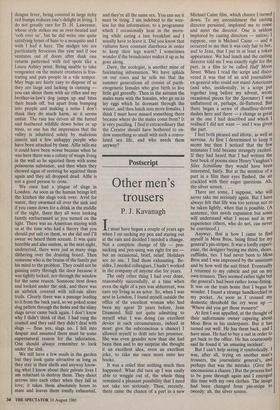Home life
Slugging it out
Alice Thomas Ellis
What a bitter, sullen summer — or perhaps it's just me. I'm feeling very resentful because I've hardly set foot out of doors for fear of being soaked to the skin by the rain which sweeps over the hills or blown off my feet by the wind which roars up the valley, and in spite of this incarcera- tion I have been bitten by some sneaking mosquito which has entered the house. While there is no danger of malaria or dengue fever, being covered in large itchy red bumps reduces one's delight in living. I do not greatly care for D. H. Lawrence, whose style strikes me as over-heated and `ooh ever so', but he did write one quite satisfying hymn of hate to a mosquito and I wish I had it here. The midges too are particularly ferocious this year and if one ventures out of doors after dusk one returns patterned with red spots like a Laura Ashley print. Being unable to take vengeance on the minute creatures is frus- trating and puts people in a vile temper. May bugs are fairly easy to dispose of as they are large and lacking in cunning you can shoot them with air rifles and my brother-in-law's dog jumps up and bites their heads off, but apart from bumping into people and making a noise I don't think they do much harm, so it seems unfair. The rain has driven all the furred and feathered wildlife down holes or up trees, so one has the impression that the valley is inhabited solely by malicious insects and a few unhappy people who have been attacked by them. Alfie tells me it could have been worse because when he was here there was a colony of wasps living in the wall so he squirted them with some poisonous substance, and then when they showed signs of reviving he squirted them again and they all dropped dead. Alfie is not a good person to cross.
We once had a plague of slugs in London. As soon as the human beings left the kitchen the slugs took over. Avid for water, they swarmed all over the sink and if you came down for a drink in the middle of the night, there they all were looking faintly embarrassed as you turned on the light. There was an American staying with us at the time who had a theory that you should put salt on them, so she did and I'll swear we heard them scream. It was quite horrible and also useless, as the next night, undeterred, there were just as many slugs slithering over the draining board. Then someone who is the brains of the family put his mind to the problem. They could not be gaining entry through the door because it was tightly locked, nor through the window for the same reason. Someone bent down and looked under the sink, and there was an airbrick covered with tell-tale silver trails. Clearly there was a passage leading to it from the back yard, so we poked some slug pellets through the holes and the slimy slugs never came back again. I don't know why I didn't think of that. I had rung the council and they said they didn't deal with slugs — fleas yes, slugs no. I fell into despair and assumed there must be some supernatural reason for the infestation. One should always remember to look under the sink.
We still have a few snails in the garden but they look quite attractive as long as they stay in their shells and anyway know- ing what I know about their private lives I am reluctant to destroy them. They shoot arrows into each other when they fall in love; it takes them absolutely hours to mate and leaves them totally exhausted, and they're all the same sex. You can see it must be tiring. I am indebted to the wire- less for this information; to a programme which I occasionally hear in the morn- ing while eating a late breakfast and I usually have to leave it. Did you know that vultures have constant diarrhoea in order to keep their legs warm? I sometimes wonder if the broadcaster makes it up as he goes along.
Dave, the ecologist, is another mine of fascinating information. We have aphids on our roses and he tells me that the summer generations all consist of parth- enogenetic females who give birth to live little girl greenfly. Then in the autumn the males mate with the females, who go on to lay eggs which lie dormant through the winter, and then hatch into more females. I think I must have missed something there because where do the males come from? It is very puzzling. I find it extraordinary that the Creator should have bothered to en- dow something so small with such a convo- luted sex life, and who needs them anyway?











































 Previous page
Previous page